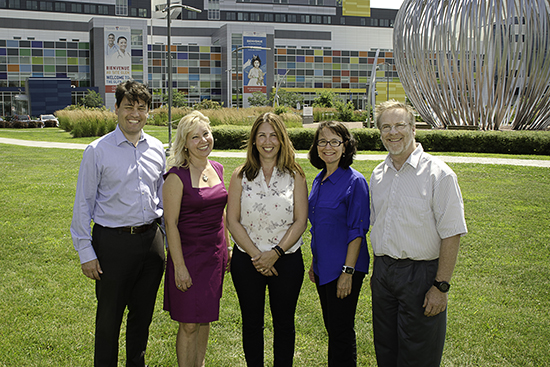Reducing Surgical Infections to Improve Patient Care
Tucked away in a sanitized, non-descript corner of the fifth floor of the Glen site’s E-Block, a pioneering team from the Infection Prevention and Control Service, Infectious Diseases, surgical teams and pharmacy have significantly impacted the healthcare environment for surgical patients at the McGill University Health Centre (MUHC).
Dr. Charles Frenette and the four-person team is using a variety of measures to battle Surgical Side Infections (SSIs), including long-term data analytics, a remodeling of surgical protocol, a revision of surgical prophylaxis and stealth-like determination to achieve its goals. The end result has been a substantial drop in SSIs, which has kept patients from unnecessary stays and saved the MUHC millions.
SSIs are a by-product of surgery and these infections can lead to complications such as increased chances of morbidity, mortality, C. difficile infections and a longer hospital stay, which in turn drives up costs since it means re-operations, re-imaging and more antibiotics.

Daniel Thiron, Pharmacist; Yveta Leharova, Research Coordinator Infectious Control; Connie Patterson, Infection Control Professional; Sylvie Carle, Associate Head of Pharmacy Education; Dr Charles Frenette, Director of Infection Control MUHC Adult sites
“There has been a substantial drop in SSIs, which has kept patients from unnecessary stays and saved the MUHC millions” “This benefits the patients, it benefits the hospital, it benefits society and is highly cost effective as that money can be used for other patients.” – Dr. Charles Frenette
The team has already slashed the number of infections by more than half in Cardiac and Transplant surgeries and they expect to keep trending in that direction until the MUHC is positioned as a Canadian leader in limiting SSIs. They are well on their way with institutions from across Canada seeking guidance as a result of their results, which nearly won the team a 2017 Hippocrate Prize for multidisciplinary collaboration in improving health care.
“There is not much data published in Quebec and Canada in relation to SSIs, it’s quite a task and a lot of hard work to gather all of this documentation of infections so we are one of the pioneers of this in Quebec and Canada,” Dr. Frenette said. “It’s so important to have this information because it benefits the patients, it benefits the hospital, it benefits society and is highly cost effective as that money can be used for other patients.”
The project has been seven years running with a constant gradual decrease in rates of infection. Dr. Frenette’s team – which includes Yveta Leharova, Connie Patterson and Anique Decary from the MUHC – also reached out to the Université de Montréal’s Daniel Thiron, who worked as the pharmacist implicated in improving prophylaxis.
Limiting SSIs in solid organ transplants has improved with liver infection rates dropping 200 per cent thanks to new measures that include a change of prophylaxis, better timing and using chlorhexidine washes before the operation. Not one infection resulted from renal transplants in 2016.
According to Dr. Frenette, cardiac surgery used to tally almost 100 infections per year with each infection adding $75,000 in hospital stays. That number has been cut by half.
“We went from over 10 per cent of patients having infections to around five per cent. But there’s still room to improve,” said the tireless Dr. Frenette. “We think we can decrease by another two to three per cent, which would be in line with the best rates in the world.”
The team credits MUHC staff for helping make this ambitious plan a reality.
“It’s very important to have a team of surgeons who are open to feedback and recommendations. We have been able to achieve this and it makes a big difference,” said Yveta, a trained nurse clinician who is one of the team’s Infection Control Consultants. “We collected, we analyzed and we recommended – but if we do not receive collaboration then our job will not make a difference.”
Yveta points to improvements in training and educating young surgeons who also happened to come of age during the timeline of their study, which began in 2011. That added experience translated into improved results inside the operating room. The MUHC also accepts a large number of very sick patients, which can increase SSI numbers.
“I’m personally satisfied to make a difference, to feel appreciated, and to see that our work is being rewarded,” said Infection Control’s Connie Patterson, who works side-by-side with Yveta and Anique.
